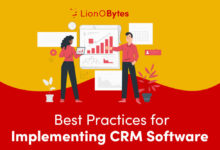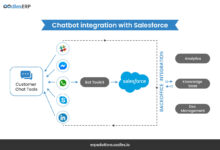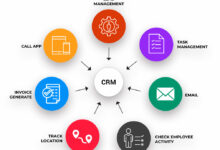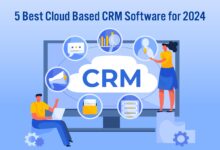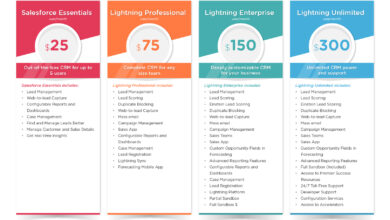CRM Software For Small Business: Streamlining Operations And Boosting Efficiency
Starting with CRM Software for Small Business, this technology has revolutionized how small businesses manage their operations and interact with customers. From organizing data to improving customer relationships, CRM software is a game-changer in the business world.
Overview of CRM Software for Small Business
CRM software, or Customer Relationship Management software, is a technology tool designed to help businesses manage interactions with current and potential customers. For small businesses, CRM software plays a crucial role in organizing customer data, improving customer relationships, and boosting overall sales and revenue.
One of the key benefits of using CRM software for small businesses is the ability to centralize customer information in one place. This allows businesses to track customer interactions, preferences, and purchase history, making it easier to personalize marketing efforts and provide better customer service.
Furthermore, CRM software helps small businesses streamline their sales processes, automate repetitive tasks, and improve efficiency. By having access to valuable insights and analytics, businesses can make data-driven decisions and optimize their sales strategies.
When comparing CRM software features tailored for small businesses versus large enterprises, small business solutions often offer scalability, affordability, and ease of use. These systems are typically designed to be user-friendly, require minimal training, and can be customized to meet the specific needs of small business owners. On the other hand, CRM software for large enterprises may include more advanced features, integrations, and customization options to cater to complex business operations and larger customer bases.
Key Features to Look for in CRM Software
When selecting CRM software for small businesses, it is crucial to prioritize key features that can enhance efficiency and productivity. Automation tools, customization options, and other essential features play a significant role in streamlining processes and improving customer relationships.
Automation Tools
Automation tools are essential in CRM software as they can help streamline repetitive tasks, such as sending follow-up emails, scheduling appointments, and updating customer information. By automating these processes, small businesses can save time and focus on more strategic activities that drive growth and revenue.
Customization Options
Customization options are vital for small businesses to tailor the CRM software to their specific needs and workflows. Being able to customize fields, layouts, and reports can help businesses track and manage customer interactions more effectively. This flexibility ensures that the CRM software aligns with the unique requirements of the business, ultimately leading to better results and customer satisfaction.
Implementation and Integration of CRM Software
Implementing CRM software effectively in a small business is crucial for maximizing its benefits. Here is a step-by-step guide to help you through the process and ensure a successful integration with other tools commonly used by small businesses.
Step-by-Step Guide for Implementing CRM Software
- Define your objectives: Clearly outline what you want to achieve with CRM software and how it aligns with your business goals.
- Choose the right CRM software: Select a CRM solution that fits your business size, industry, and specific needs.
- Get buy-in from stakeholders: Involve key team members in the decision-making process to ensure smooth adoption.
- Customize the CRM software: Tailor the software to your business processes and workflows for maximum efficiency.
- Train your team: Provide comprehensive training to ensure all employees understand how to use the CRM software effectively.
- Test and refine: Conduct thorough testing to identify any issues and make necessary adjustments before full deployment.
- Roll out gradually: Implement the CRM software in phases to minimize disruptions and allow for feedback and improvements.
- Monitor and evaluate: Continuously monitor performance metrics and gather feedback to make ongoing enhancements.
Integration Capabilities of CRM Software
- Integration with email marketing tools: Seamlessly connect CRM software with email marketing platforms to enhance customer engagement.
- Integration with accounting software: Sync CRM data with accounting tools for streamlined financial management and reporting.
- Integration with project management tools: Combine CRM software with project management systems to improve collaboration and task tracking.
- Integration with e-commerce platforms: Integrate CRM with e-commerce platforms to enhance customer shopping experiences and increase sales.
Challenges and Solutions
- Resistance to change: Address resistance by highlighting the benefits of CRM software for employees and providing adequate training and support.
- Data migration issues: Plan ahead for data migration challenges by ensuring data accuracy and consistency before transferring to the new CRM system.
- Lack of user adoption: Encourage user adoption by involving employees early in the implementation process, providing ongoing training, and showcasing success stories.
Best Practices for Utilizing CRM Software
Implementing CRM software is a crucial step for small businesses to enhance customer relationships and streamline operations. To maximize the benefits of CRM software, it is essential to follow best practices that ensure data accuracy, consistency, and efficient usage.
Maintaining Data Accuracy and Consistency
Ensuring that the data within your CRM software is accurate and consistent is vital for making informed business decisions and providing personalized customer experiences. Here are some best practices to maintain data accuracy and consistency:
- Regularly clean and update customer data to remove duplicates and outdated information.
- Implement data validation rules to prevent incorrect or incomplete data entry.
- Define clear processes for data entry and establish data governance policies within your organization.
- Regularly audit your data to identify and rectify any inconsistencies or errors.
Significance of Regular Training for Employees
Proper training for employees using CRM software is essential to ensure that they can leverage its full potential and maximize productivity. Here are some tips for conducting regular training sessions:
- Provide comprehensive training sessions for new employees to familiarize them with the CRM software’s features and functionalities.
- Offer refresher courses and advanced training for existing employees to keep them updated on new features and best practices.
- Encourage employees to share their experiences and best practices for using CRM software effectively within the organization.
- Monitor user adoption and provide ongoing support to address any challenges or issues faced by employees while using CRM software.
Cost Considerations for Small Business CRM Software
When choosing a CRM software for your small business, it is essential to consider the cost implications. Understanding the different pricing models, comparing cloud-based versus on-premise solutions, and identifying hidden costs can help you make an informed decision that aligns with your budget and business needs.
Different Pricing Models
- Subscription-Based: This model involves paying a monthly or annual fee for using the CRM software. It is a popular choice for small businesses as it offers flexibility and scalability.
- Perpetual Licensing: In this model, you pay a one-time fee to own the software license indefinitely. While it may require a larger upfront investment, it can be cost-effective in the long run.
- Freemium: Some CRM software providers offer basic features for free, with the option to upgrade to a paid plan for additional functionalities. This can be a good way to test the software before committing to a paid plan.
Cloud-Based vs. On-Premise Solutions
- Cloud-Based CRM: Typically charged on a subscription basis, cloud-based CRM software offers lower upfront costs, automatic updates, and accessibility from any device with an internet connection. However, ongoing subscription fees can add up over time.
- On-Premise CRM: With on-premise solutions, you purchase and host the software on your own servers. While this may require a higher initial investment and ongoing maintenance costs, it provides greater control over data security and customization.
Hidden Costs of CRM Software Implementation
- Integration Costs: Integrating CRM software with existing systems or third-party applications can incur additional expenses for customization and support.
- Training and Support: Training your employees to use the CRM software effectively and providing ongoing support can add to the overall cost of implementation.
- Data Migration: Moving data from legacy systems to the new CRM software may involve data cleansing, mapping, and migration costs.
Security and Data Privacy in CRM Software
Data security is a critical aspect of CRM software for small businesses, as it involves handling sensitive customer information. Ensuring the security and privacy of data not only protects the business from potential breaches but also builds trust with customers.
Key Security Features to Look for
- Encryption: Look for CRM software that offers encryption capabilities to secure data both in transit and at rest.
- Access Control: Implement role-based access control to restrict access to sensitive data only to authorized personnel.
- Audit Trails: Choose a CRM system that provides audit trails to track any changes made to the data and identify potential security incidents.
- Data Backup and Recovery: Ensure that the CRM software has robust backup and recovery mechanisms in place to prevent data loss in case of emergencies.
- Integration with Security Tools: Opt for CRM software that integrates seamlessly with other security tools like antivirus software and firewalls for added protection.
Ensuring Compliance with Data Privacy Regulations
- Understand Regulations: Familiarize yourself with data privacy regulations like GDPR, CCPA, or HIPAA, depending on your location and industry.
- Consent Management: Obtain explicit consent from customers before collecting and processing their personal data through the CRM software.
- Data Minimization: Collect only the necessary data required for business operations and ensure that it is stored securely within the CRM system.
- Data Transfer Safeguards: Implement secure data transfer protocols to prevent unauthorized access or data breaches during data exchange.
- Regular Audits: Conduct regular audits of the CRM software to identify any potential vulnerabilities and ensure compliance with data privacy regulations.
Customization and Scalability in CRM Software
Customization and scalability are crucial aspects of CRM software for small businesses, as they allow for tailored solutions that can grow and evolve along with the company’s needs.
Benefits of Customizable Features
Customizable features in CRM software enable small businesses to adapt the system to their specific requirements. This flexibility allows for the inclusion of unique data fields, workflows, and reporting metrics that are essential to the business operations. By customizing the software, companies can streamline processes, improve efficiency, and enhance customer interactions.
- Customized dashboards: Small businesses can create personalized dashboards that display key metrics and reports relevant to their operations, providing quick access to essential information.
- Unique data fields: Adding custom data fields allows businesses to capture specific information relevant to their industry or customer base, enabling more targeted marketing and personalized customer interactions.
- Workflow automation: Customizing workflows within the CRM software can automate repetitive tasks, saving time and ensuring consistency in processes.
Role of Scalability
Scalability is vital for the long-term viability of CRM software for small businesses. As companies grow and evolve, they need a system that can expand to accommodate increasing data volumes, users, and functionalities. Scalable CRM software can adapt to the changing needs of the business without requiring a complete overhaul of the system, providing a cost-effective solution for future growth.
- Increased data storage capacity: Scalable CRM software can handle large amounts of data as the business grows, ensuring that historical information remains accessible for analysis and decision-making.
- User scalability: The ability to add new users to the system easily allows small businesses to onboard employees as needed without disrupting operations.
- Integration capabilities: Scalable CRM software can integrate with other business tools and systems as the company expands, ensuring seamless communication and data sharing across platforms.
Examples of Impact
Several small businesses have benefited from the customization and scalability features of CRM software. For instance, a local retail store customized their CRM to track customer preferences and purchase history, enabling targeted marketing campaigns that significantly increased sales. As the business expanded, the scalable CRM software seamlessly accommodated the growing customer base and additional sales channels, supporting continued growth and success.
User Experience and Interface Design in CRM Software
User experience and interface design play a crucial role in the successful implementation of CRM software for small businesses. A user-friendly interface can significantly impact user adoption rates and overall productivity within the organization.
Importance of User-Friendly Interfaces
Having a user-friendly interface in CRM software can make it easier for employees to navigate the system, access important data, and utilize key features efficiently. This can lead to higher user satisfaction, increased productivity, and ultimately, better customer relationships.
- Intuitive design can reduce the learning curve for employees, allowing them to quickly adapt to the CRM software and start utilizing its functionalities effectively.
- Clear navigation and organized layouts can streamline workflows, making it easier for users to find the information they need and perform tasks efficiently.
- Customizable interfaces can cater to the specific needs of small businesses, ensuring that the CRM software aligns with their unique processes and requirements.
Examples of Well-Designed CRM Software Interfaces
Several CRM software platforms offer user-friendly interfaces tailored to the needs of small businesses. These interfaces are designed to enhance usability, improve productivity, and provide a seamless user experience.
| CRM Software | Key Interface Features |
|---|---|
| Zoho CRM | Customizable dashboards, drag-and-drop functionality, visual pipelines for sales tracking |
| HubSpot CRM | Simple layout, easy data entry, seamless integration with other business tools |
| Salesforce Essentials | Intuitive interface, guided setup, mobile access for on-the-go productivity |
Customer Support and Training for CRM Software
Customer support and training are crucial aspects for small businesses utilizing CRM software to ensure successful implementation and optimal usage. Here are some best practices to consider:
Adequate Customer Support Strategies
- 24/7 Online Support: CRM software providers should offer round-the-clock online support through chat, email, or ticketing systems to address any issues promptly.
- Dedicated Account Managers: Having a dedicated account manager can provide personalized assistance and ensure that small businesses receive the support they need.
- Knowledge Base and Resources: A comprehensive knowledge base with tutorials, FAQs, and resources can empower users to troubleshoot common problems independently.
Role of Training Programs
Training programs play a vital role in helping small business teams effectively utilize CRM software. Some key points to consider include:
- Onboarding Sessions: Conducting onboarding sessions for new users can familiarize them with the software features and functionalities.
- Ongoing Training: Continuous training sessions and refresher courses can help employees stay up-to-date with the latest updates and best practices.
- Certification Programs: Offering certification programs can enhance user expertise and ensure proficiency in using the CRM software.
Effective Customer Support Strategies by CRM Software Vendors
CRM software vendors can implement various strategies to provide effective customer support, such as:
- Live Chat Support: Real-time assistance through live chat can quickly resolve customer queries and issues.
- Community Forums: Creating community forums where users can interact, share tips, and seek advice can foster a collaborative support environment.
- Regular Updates and Communication: Keeping users informed about updates, new features, and system enhancements can enhance user experience and satisfaction.
Integration with Marketing and Sales Tools
CRM software plays a crucial role in helping small businesses streamline their marketing and sales efforts. By integrating CRM software with marketing automation tools and sales management platforms, businesses can enhance lead generation and improve overall efficiency.
Enhanced Lead Generation
- Integration between CRM software and marketing automation tools allows for the seamless flow of data, enabling targeted and personalized marketing campaigns based on customer interactions and behavior.
- Automating lead nurturing processes through CRM integration with marketing tools ensures timely follow-ups and increases the chances of converting leads into customers.
- Tracking and analyzing customer interactions across various channels become more efficient, providing valuable insights for targeted marketing strategies.
Improved Sales Management
- Integration between CRM software and sales management platforms enables sales teams to access real-time customer data, track sales activities, and manage pipelines effectively.
- Automating sales processes through CRM integration helps in identifying potential upsell and cross-sell opportunities, leading to increased revenue generation.
- Seamless communication between marketing and sales teams becomes possible, ensuring alignment and collaboration towards common business goals.
Successful Collaborations
- Examples of successful collaborations between CRM software and marketing/sales platforms include Salesforce CRM integrating with HubSpot for marketing automation or Zoho CRM integrating with Mailchimp for email marketing campaigns.
- Small businesses can benefit from such integrations by leveraging the combined power of CRM, marketing, and sales tools to drive growth and achieve sustainable success.
- Customizing integrations based on specific business needs and goals can further enhance the effectiveness of marketing and sales strategies, leading to improved ROI.
Case Studies and Success Stories
In this section, we will explore real-world examples of small businesses that have leveraged CRM software to achieve growth and efficiency.
Small Business A: Improving Customer Relationships
- Small Business A, a boutique clothing store, faced challenges in managing customer data and preferences.
- By implementing CRM software, they were able to centralize customer information, track purchase history, and personalize marketing campaigns.
- As a result, Small Business A saw a 20% increase in customer retention and a 15% growth in sales within the first year of using CRM software.
Small Business B: Streamlining Operations
- Small Business B, a local service provider, struggled with manual processes and communication gaps between teams.
- With CRM software integration, they automated task assignments, streamlined communication, and improved collaboration among departments.
- Small Business B experienced a 30% reduction in response time and a 25% increase in productivity after implementing CRM software.
Small Business C: Enhancing Marketing Campaigns
- Small Business C, a tech startup, found it challenging to target the right audience and track marketing campaign performance.
- By utilizing CRM software for lead management and analytics, they were able to segment their audience effectively and measure campaign success.
- Small Business C achieved a 40% increase in lead conversion rates and a 20% decrease in customer acquisition costs through targeted marketing efforts enabled by CRM software.
Ending Remarks
In conclusion, CRM Software for Small Business offers a plethora of benefits, from enhancing customer interactions to streamlining processes. By leveraging the right CRM software, small businesses can experience significant growth and success in today’s competitive market.


